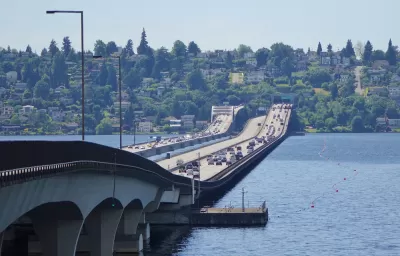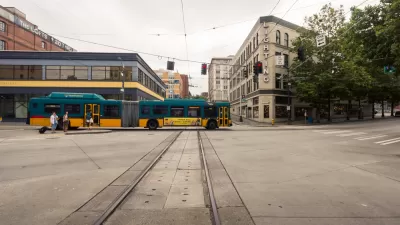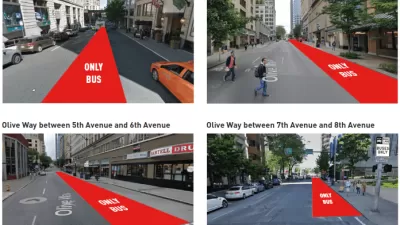The Seattle Department of Transportation is searching for ways to remove 3,000 cars from the roads every day.

The number of solo car commuters dropped by 4,500 a day in Seattle between 2010 and 2017—a laudable accomplishment and the envy of many a gridlocked city. But the Seattle Department of Transportation has set a goal to remove an additional 3,000 cars from the roads, and a few upcoming construction projects have added some pressure to the timeline on that goal.
Josh Cohen reports that the Seattle Department of Transportation launched a microtransit pilot project earlier this year, but the City Council quickly shot the project down (it's not the only microtransit experiment in the country to fall short). Still, the city is looking for solutions, according to Cohen:
But the traffic problem is growing and the city needs a solution, even if it’s not going to be with private transit experiments. One idea – supported by advocates, bus drivers and some councilmembers – is to invest deeply to improve the bus system we already have. Mayor Jenny Durkan has floated a tax on private vehicles to discourage driving downtown. Seattle’s eastside neighbors think self-driving vehicles could solve their problems. Bike advocates remind us that bikes take up far less space than cars and could help, if only we make downtown a safe place to ride.
Throughout the remainder of the article, Cohen takes a closer look at these ideas, sifting through pros and cons and the current political and economic viability of each.
FULL STORY: 5 ways to make Seattle traffic less terrible

Planetizen Federal Action Tracker
A weekly monitor of how Trump’s orders and actions are impacting planners and planning in America.

Map: Where Senate Republicans Want to Sell Your Public Lands
For public land advocates, the Senate Republicans’ proposal to sell millions of acres of public land in the West is “the biggest fight of their careers.”

Restaurant Patios Were a Pandemic Win — Why Were They so Hard to Keep?
Social distancing requirements and changes in travel patterns prompted cities to pilot new uses for street and sidewalk space. Then it got complicated.

Platform Pilsner: Vancouver Transit Agency Releases... a Beer?
TransLink will receive a portion of every sale of the four-pack.

Toronto Weighs Cheaper Transit, Parking Hikes for Major Events
Special event rates would take effect during large festivals, sports games and concerts to ‘discourage driving, manage congestion and free up space for transit.”

Berlin to Consider Car-Free Zone Larger Than Manhattan
The area bound by the 22-mile Ringbahn would still allow 12 uses of a private automobile per year per person, and several other exemptions.
Urban Design for Planners 1: Software Tools
This six-course series explores essential urban design concepts using open source software and equips planners with the tools they need to participate fully in the urban design process.
Planning for Universal Design
Learn the tools for implementing Universal Design in planning regulations.
Heyer Gruel & Associates PA
JM Goldson LLC
Custer County Colorado
City of Camden Redevelopment Agency
City of Astoria
Transportation Research & Education Center (TREC) at Portland State University
Camden Redevelopment Agency
City of Claremont
Municipality of Princeton (NJ)




























